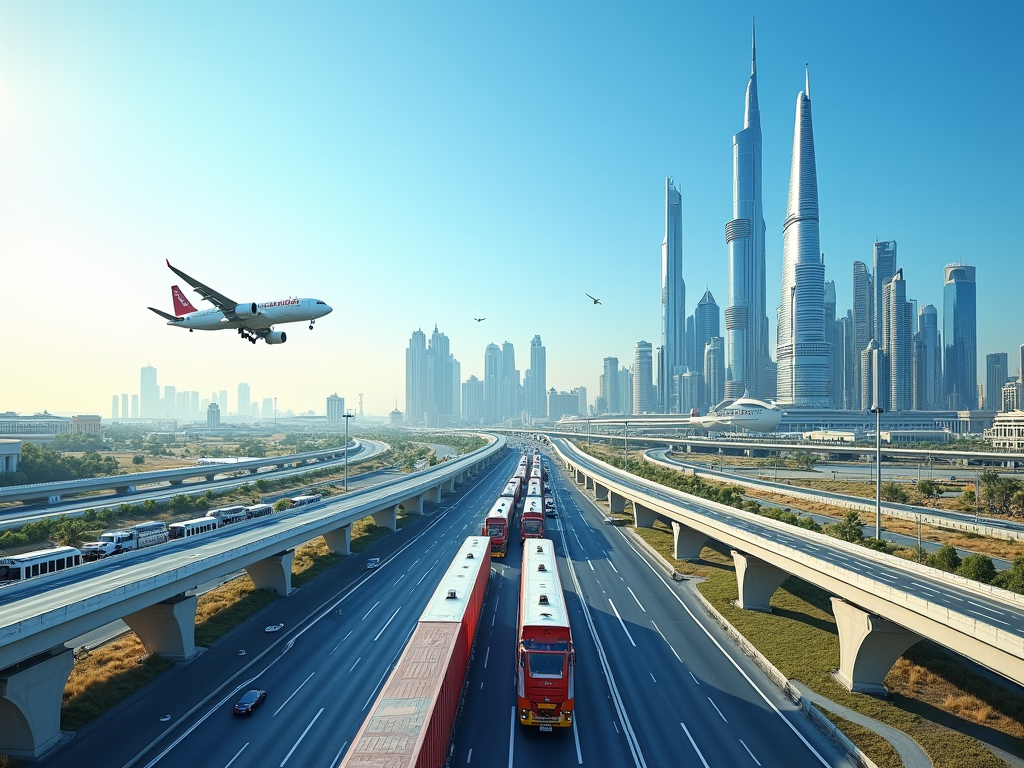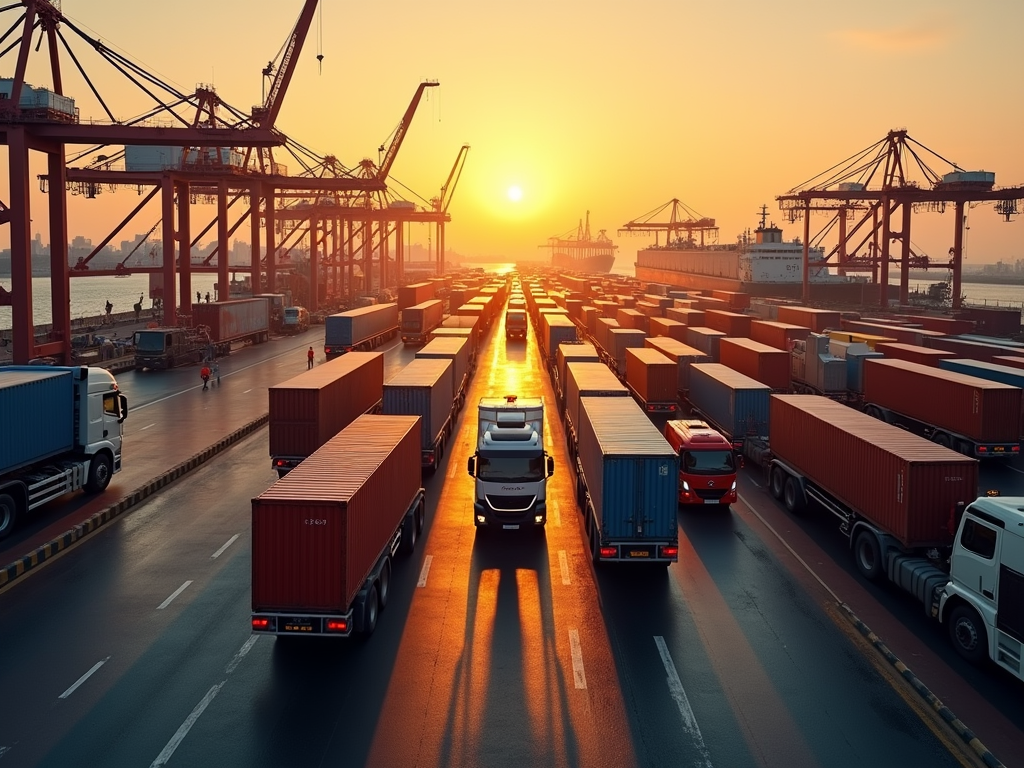Dubai’s transport and logistics industry plays a crucial role in shaping the business landscape within the region and beyond. As a major global trading hub, it offers unparalleled connectivity and efficiency, serving as a gateway for goods flowing to and from various markets. The improvements in logistics and transportation infrastructure have boosted trade volumes, enhanced supply chain efficiencies, and facilitated the growth of numerous sectors. Businesses operating in Dubai benefit from its strategic location, modern facilities, and advanced technological integration, ultimately driving economic growth and competitiveness. This article further explores the multifaceted impacts of the transport and logistics industry on businesses in Dubai.
1. Transformation of Trade Facilitation

The evolution of Dubai’s transport and logistics sector has significantly transformed the manner in which trade is facilitated. With modernized ports, such as Jebel Ali, and a rapidly expanding airport, the city has positioned itself as a pivotal center for international commerce. Key aspects include:
- Advanced Connectivity: Dubai’s strategic location between Europe, Asia, and Africa allows businesses to access new markets efficiently.
- Multimodal Transport Options: The integration of air, sea, and rail transport ensures flexibility and cost-effectiveness for businesses moving goods.
- Free Trade Zones: These zones offer tax incentives and enhance ease of doing business, attracting foreign investment and supporting local enterprises.
Consequently, companies in Dubai can streamline their supply chains, reduce lead times, and improve customer satisfaction, fostering a robust trading environment.
2. Enhancing Supply Chain Efficiency

Dubai’s logistics industry employs state-of-the-art technology solutions that directly enhance supply chain efficiency. Innovations such as automated warehousing, real-time tracking systems, and data analytics applications have transformed traditional logistics. Some of the key benefits include:
- Real-Time Monitoring: Businesses can track shipments accurately, allowing prompt decision-making and minimizing delays.
- Cost Reductions: Increased operational efficiency leads to lower logistics and transportation costs, translating into better profit margins.
- Scalability: The industry’s ability to adapt rapidly allows businesses to scale operations according to market demands.
These technological advancements ensure that companies can maintain competitive advantages and respond effectively to changing market conditions.
3. Supporting Diverse Economic Sectors
The dynamism of Dubai’s transport and logistics industry has far-reaching implications for various economic sectors. From tourism to e-commerce, many industries benefit from improved logistics capabilities. Key sectors supported include:
- Retail: The growth of online shopping has necessitated efficient distribution networks that logistics firms readily provide.
- Manufacturing: Quick access to raw materials and finished products enhances production timelines and lowers costs.
- Tourism: Efficient transport networks improve the experience for tourists, promoting Dubai as a premier travel destination.
This interdependence of logistics with other sectors emphasizes its critical role in Dubai’s economic framework, promoting diversification and sustainability.
The regulatory environment in Dubai has been designed to support the growth of the transport and logistics industry. Government initiatives aimed at developing infrastructure, liberalizing trade policies, and promoting public-private partnerships have been pivotal. They include:
- Investment in Infrastructure: Significant investments in road construction, port facilities, and airport expansions are ongoing to enhance capacity and operations.
- Trade Facilitation Measures: Simplified customs procedures and reduced tariffs streamline operations for businesses engaged in international trade.
- Public-Private Partnerships: Collaborations between the government and private entities ensure innovation and improvements in the logistics sector.
The combined effect of these initiatives has cultivated an environment conducive to business growth and operational success.
5. Future Prospects of Dubai’s Transport and Logistics Industry
The future of Dubai’s transport and logistics industry is characterized by innovation and sustainability, a response to global challenges. Emerging trends include:
- Sustainability Initiatives: Companies are increasingly focusing on eco-friendly transportation methods and practices to reduce carbon footprints.
- Smart Technologies: The rise of AI and automation in logistics operations promises enhanced operational efficiency and reduced human error.
- Growth of E-Commerce Logistics: Companies are adapting to the surge in online shopping by developing sophisticated last-mile delivery options.
These developments not only benefit businesses looking to adapt but also contribute to establishing Dubai as a benchmark for logistics excellence globally.
Conclusion
Dubai’s transport and logistics industry remains a cornerstone of its business ecosystem, significantly impacting trade dynamics, supply chain management, and economic diversification. By continually advancing infrastructure, regulating efficiently, and promoting innovation, Dubai enhances its attractiveness as a global business hub. As the industry evolves, businesses that leverage these developments will thrive, fortifying Dubai’s position on the world stage.
Frequently Asked Questions
1. How has Dubai’s transport infrastructure influenced its economy?
Dubai’s transport infrastructure fosters trade and connectivity, directly stimulating economic growth and attracting foreign investment, which helps diversify the local economy.
2. What role do free trade zones play in Dubai’s logistics sector?
Free trade zones provide tax incentives and simplified regulations, encouraging businesses to set up operations in Dubai, thus contributing to the expansion of the logistics industry.
3. How is technology shaping the logistics industry in Dubai?
Technological advancements such as automated systems, real-time tracking, and data analytics enhance operational efficiency and reduce costs for logistics providers and businesses alike.
4. What are the emerging trends in Dubai’s logistics sector?
Key trends include sustainability initiatives, smart technology integration, and the growth of e-commerce logistics, as businesses adapt to evolving market demands.
5. How does Dubai support businesses in the transport and logistics industry?
The government offers a favorable regulatory framework, invests in infrastructure development, and promotes public-private partnerships to support and grow the logistics sector in Dubai.
